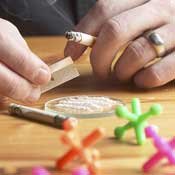Wednesday, September 21, 2011
Addiction is described in the "Alcoholics Anonymous Big Book" as "cunning, baffling, powerful." Its reach is widespread. Else Pedersen, executive director of Bridge House, an addiction treatment center in New Orleans, La., estimates 10 to 15 percent of the population has an addiction.
"This is everywhere, and it needs to be dealt with like the medical issue it is," she says. "We need to give it the same attention we give other diseases that are progressive, pervasive and potentially lethal."
In August, the American Society of Addiction Medicine released a new definition of addiction as a chronic, underlying, largely genetic brain disease.
"The disease is about brains, not drugs," former president of ASAM Dr. Michael Miller stated in a press release.
"It's about underlying neurology, not outward actions." Miller oversaw a four-year effort by more than 80 addiction experts and neuroscience researchers that yielded the new definition.
Dr. Ken Roy, medical director of Addiction Recovery Resources Incorporated in Metairie, La., calls it a game-changer.
"This is a definition based on a consensus of expert opinion and scientific literature that changes the understanding of addiction from a choice or a self-treatment to a condition of brain structures that basically compels behavior outside the ability to choose," he says. "Addiction is not a choice."
The new definition says addiction is a primary disease, like diabetes or cardiovascular disease, and it can be a root cause behind other problems like depression, social isolation and anxiety. "Genetic factors account for about half the likelihood that an individual will develop addiction"—meaning if your parent is an addict, you are predisposed to addiction.
Addicts' brains function differently, says Dr. Howard Wetsman, medical director at Townsend, a network of New Orleans outpatient addiction treatment centers. Many addicts have a mutation in genes associated with production, release, re-uptake and metabolizing of dopamine. "People who have a low dopamine tone are not able to make great attachments and feel rewards from normally rewarding activities, and that is when the drug or behavior comes along. Our society likes to think that drugs cause addiction. It's actually the other way around for most people with addiction. The addiction causes the drug use," he writes in "QAA: Questions and Answers on Addiction" (Rush Press, 2007, $12.95). Wetsman has instituted genetic testing as part of Townsend's intake procedure.
John Antonucci, an intake coordinator at Townsend and recovering addict, says "... t is amazing when you take a patient and their family members, and they realize it really is a biological brain disease. ... I have seen family members break down and cry when they realize all this time, their kids weren't doing this to spite them. They were doing it because they were sick."
Though Antonucci says nine out of 10 of Townsend's patients report addiction in their families, some addicts are without a family history or genetic indication of the disease. It can sometimes be hard to trace, Wetsman says.
Recovering addict Darryl Rouson, now a Florida state representative, had no known family history of addiction. He began drinking and using cocaine in the 1980s. Rouson says he has been through eight treatment programs, but he has never had genetic testing. But neither testing nor medications are necessary for recovery.
"There are millions of people who have gotten sober by going to 12-step meetings (such as Alcoholics Anonymous or Narcotics Anonymous). For some people, that works," says Jo Cohen, clinical director of New Orleans Bridge House and Grace House.
Some addicts benefit from medications like Suboxone; some require long-term inpatient treatment; others stay sober by attending 12-step meetings. Antonucci stresses that a strong routine of recovery-related activities like meetings or volunteering helps maintain sobriety, as does help from addiction doctors.
Rouson manages his addiction by attending 12-step meetings, sponsoring recovering addicts, reading AA literature, and sharing his story at prisons and recovery centers.
Antonucci and Rouson say their community work, a tenant of AA, is essential to their sobriety. And though there may seem to be a disconnect between the scientific, biologically based addiction definition and the spiritually based 12-step programs, ASAM's research supports activities recovering addicts undertake in 12-step recovery programs.
"Doing something really healthy for the community has changed my brain chemistry," Antonucci says.
The Mississippi Department of Mental Health administers alcohol and drug abuse prevention and treatment services. For information, visit dmh.state.ms.us/substance_abuse.htm.
Jackson also has dozens of private alcohol and drug addiction programs and rehabilitation centers. For information, visit http://www.treatmentcentersdirectory.com/Mississippi/Jackson.
This story originally ran in Gambit, New Orleans' alternative newsweekly.
